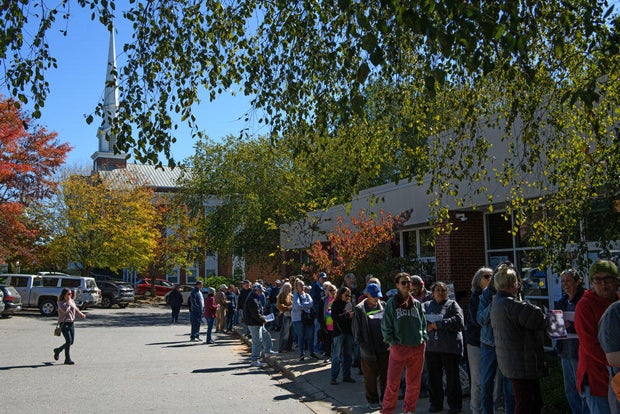CBS News
Hurricane Helene’s devastation hasn’t stopped western North Carolinians from voting early

Hurricane Helene, North Carolina’s deadliest storm in modern times, ravaged communities in the westernmost corners of the state, but it has not deterred resilient residents from early voting. In fact, turnout is shattering records in a battleground state that could determine the outcome of the 2024 presidential election.
“What most of the affected counties are seeing is tremendous turnout,” said Karen Brinson Bell, executive director of the North Carolina State Board of Elections. “We have seen a large outpouring just from the voters themselves, coming to the county boards of elections, making sure that they can still be a poll worker, making sure that they’re going to be able to cast their ballot.”
Melissa Sue Gerrits / Getty Images
With damage estimates exceeding $50 billion, Helene left some of the most severely impacted regions without power, clean water, critical roadways and infrastructure over a month after it made landfall.
But election workers’ swift pivot to emergency measures and coordination with state administrators in the immediate aftermath of Helene have resulted in a relatively smooth early voting process for residents in the 25 FEMA-designated disaster counties. Statewide, more than 2 million cast their ballots within the first week of early voting in the battleground state.
Questions have persisted in some circles about whether this heavily-damaged swath of North Carolina would be ready for the 2024 elections. Last week, GOP Rep. Andy Harris of Maryland, the chair of House Freedom Caucus, suggested the Legislature should consider awarding the state’s electoral votes to former President Trump before votes were counted.
“Look, you got disenfranchised in 25 counties, you know what that vote probably would’ve been,” Rep. Harris said during a discussion at the Lincoln Reagan dinner in Maryland.
Harris’ comments sparked an immediate backlash from his North Carolina GOP colleague, Rep. Patrick McHenry. “It makes no sense whatsoever to prejudge the election outcome, and that is a misinformed view of what is happening on the ground in North Carolina,” McHenry said.
In a statement to CBS News, Harris offered a clarification and said his “theoretical” exchange had been taken out of context. “As I’ve repeatedly said, every legal vote should be counted,” Harris said. “Currently, voting is going very well in Western North Carolina.”
Measures implemented by the Legislature and the State Board of Elections in recent weeks have allowed special accommodations to be made for the hardest-hit counties. That includes new polling sites, expanded voting hours and more absentee ballot drop-off locations. Of the 80 sites initially planned for early voting in the affected counties, 76 are currently operational, with plans to expand, according to election officials.
For Yancey County residents like Victor Mansfield, not voting was never an option. “Nothing was going to stop me from voting,” he said.
Mansfield lives along a one-lane mountain road in Burnsville, North Carolina, in one of the counties heavily damaged by the storm. He had no electricity for four days before he hiked downhill to a shelter at a Red Cross facility. Mansfield said he was surprised by turnout on the second day of early voting when he cast his ballot. “I was voter number 1,276,” he said. “I know some other folks I go to church with whose house was completely destroyed… they made sure they were here so they could early vote.”
More than one-third of Yancey County’s 14,600 registered voters have cast their ballots early and in person so far, according to county board officials, averaging approximately 700 voters per day since voting began on Oct. 17.
Joseph Trivette, deputy director of the Avery County Board of Elections says despite the significant challenges, turnout in his county has been noteworthy.
“We’re averaging right around 500 a day. I know it may not sound big to other places, but for Avery we have a total of 13,000 voters to give or take some…averaging 500 a day is huge,” said Trivette. “Avery County always comes out to vote, no matter who you’re voting for.”
Buncombe County, the largest in western North Carolina and home to 214,530 registered voters, initially saw modest early voting numbers. But within days, there was an impressive surge in turnout, averaging more than 7,000 voters per day.
“I’m liking the trend, people are getting out every single day to do this,” said Jake Quinn, chair of the Buncombe County Board of Elections. “If we can just continue this through next week, we’re gonna be pretty good.”
The Republican National Committee and the North Carolina Republican Party asserted more could be done to address limited access for hurricane-affected voters in the western, traditionally Republican-leaning counties. In a letter to the Buncombe County Board of Elections and State Board of Elections, they alleged “partisan voter suppression” in Buncombe County, and demanded expanded accommodations for voters in more remote areas.
Buncombe County election officials say 10 of 14 planned early voting sites are operational, with 80 planned for Election Day, including one FEMA tent polling location, and 500 county poll workers.
“We just want to make sure that this election is smooth, as smooth as can be under these extraordinary circumstances. And we’re confident that we’ve been so careful about following processes and procedures properly, following the law, documenting everything we do, every decision we make,” said Quinn. “We’re maintaining the integrity through some mighty challenging circumstances.”
and
contributed to this report.
CBS News
Puerto Rican politicians react to Trump rally racist, offensive comments

Watch CBS News
Be the first to know
Get browser notifications for breaking news, live events, and exclusive reporting.
CBS News
More than a third of all trees species at risk of extinction, global assessment finds

More than a third of all tree species worldwide face extinction, threatening ecosystems, plants, animals and economies around the world, experts warned Monday.
In all, 38% of trees are at risk, according to the International Union for the Conservation of Nature global assessment. They face threats from climate change, deforestation, invasive species, pests and disease in almost every single country in the world.
Trees account for more than a quarter of the species on the International Union for the Conservation of Nature’s Red List. The number of threatened trees is more than double the number of threatened birds, mammals, reptiles and amphibians.
The loss of trees is a threat to thousands of plants, fungi and animals, according to the organization. Trees are considered a “defining component of many ecosystems” through their role in carbon, water and nutrient cycles, soil formation and climate regulation. According to the U.S. Department of Agriculture Forest Service, 100 trees can remove 54 tons of carbon monoxide and 430 pounds of other air pollutants a year.
“Trees directly underpin the survival of so many species – including many found on the IUCN Red List. Thriving, naturally diverse forests are essential in mitigating both climate change and biodiversity loss, and as such solutions for one crisis often have mutually reinforcing benefits for the other,” said Dr. Dave Hole, vice president for global solutions at Conservation International’s Moore Center for Science. “This makes the growing number of threatened tree species included on the Red List all the more troubling. Without biodiverse ecosystems that include healthy and diverse tree populations the world will face an even greater climate threat than the one we are already facing.”
People are also economically dependent on trees. According to IUCN, more than 5,000 of the tree species on the Red List are used for timber in construction. Over 2,000 species are used for medicines, food and fuels.
In 2021, world leaders representing more than 85% of the world’s forests pledged to end deforestation by 2030. Yet last year, 6.37 million hectares (15.7 million acres) of forest were permanently lost around the world, according to The Forest Declaration Assessment 2024.
“We are now one-third of the way through this decade, and collectively, we have barely made a dent in curbing deforestation,” according to the Forest Declaration Assessment.
A 2022 assessment of tree species native to the contiguous U.S. found 11-16% of species are threatened with extinction. The greatest threats are invasive pests and diseases.
More than 1,000 tree experts were involved in the International Union for the Conservation of Nature global assessment, which was largely funded by nonprofit Fondation Franklinia. Foundation Director General Jean-Christophe Vié urged the world to act based on the tree assessment.
“Trees are seen as an easy fix to climate change and trees are planted everywhere; but the way reforestation is done needs to be greatly improved, diversifying species and including threatened ones in tree-planting schemes,” Vié said. “Governments and their forestry departments, companies and all those planting trees could easily do this and get positive impact quickly, tackling both the climate change and biodiversity crises.”
CBS News
Latest concerns over North Korean troops in Russia

Watch CBS News
Be the first to know
Get browser notifications for breaking news, live events, and exclusive reporting.








